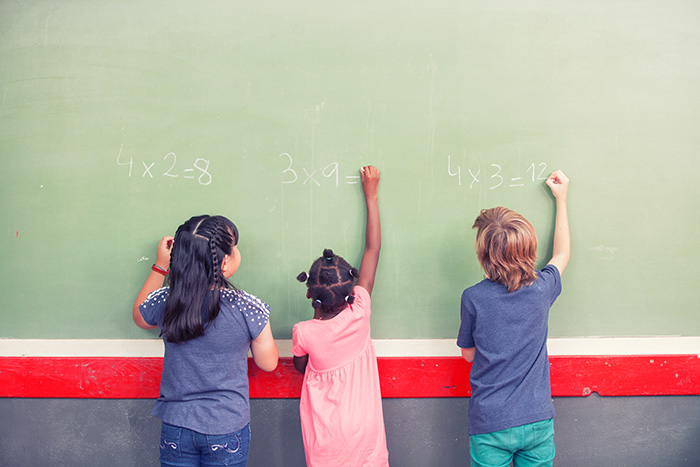By Rob Ochsendorf (NCSER Program Officer), Joan McLaughlin (NSCER Commissioner), and Liz Berke (NCSER Intern)
How would you solve this problem? 7 + 25 – 23 = ___. Skilled math students recognize key features of problems and use appropriate shortcuts when solving problems but recent research led by Dr. Katherine Robinson has shown that less than a third of 7th graders actually used shortcut strategies. Dr. Robinson noted that, “These students show strong preferences for using well-practiced rote strategies for solving these problems rather than thinking deeply and flexibly about either the problems or how they can use their knowledge of arithmetic to facilitate problem solving.”
During May of this year, Dr. Robinson and other researchers from across the world convened in St. Louis, Missouri to share findings in the growing area of research known as math cognition. This two-day conference entitled, “Typical and Atypical Learning of Complex Arithmetic Skills and Higher-Order Mathematics Concepts,” is part of a series of five annual conferences, Math Cognition and Learning Conferences (MCALC), funded by a grant from the National Institute of Child Health and Human Development (NICHD) with additional support from NCSER.
Dr. Joan McLaughlin, NCSER Commissioner, and Dr. Rob Ochsendorf attended MCALC this year and highlighted the importance of math cognition research to support students with or at risk for disabilities in their math learning. NCSER funds a number of projects in this area, including a National Research and Development Center focused on understanding the cognitive processes involved in the development of fraction skills in elementary school children. NCSER has taken an interest in the MCALC mission from the beginning and continues to support graduate students’ attendance and participation each year.

At the conclusion of this year’s meeting, NCSER staff talked with lead investigators Dan Berch (University of Virginia) and David Geary (University of Missouri) to discuss the MCALC meetings and activities, which have included the founding of a new international society for math cognition (Mathematical Cognition and Learning) and an edited book series, in addition to the annual meetings.
What do you think were the key takeaways from the 2015 MCALC meeting?
The conferences really have two important, interrelated goals. The first is social - to help researchers, especially the younger ones, develop connections with and discuss their ideas and current research with each other and senior members of the field. This networking is important for building collaborations and for finding links between different areas of mathematical cognition and learning. The second is to more fully understand mathematical learning and cognition. The focus at this meeting on individual differences highlighted the importance of domain-general and math-specific knowledge in fostering both procedural and conceptual aspects of mathematical development, and provided directions for intervention with struggling students.
What are the important long term contributions of this series of meetings?
The long-term goal of the meetings and the new society is to bring together people with a shared interest in quantitative processing and development that might otherwise not be aware of one another's work, much less discuss it one-on-one. The 5-volume series coming out of the meetings is important as well. We hope that these will provide a critical and useful reference work that highlights cutting edge advances across the whole field, from number processing in nonhumans to educational interventions.
Are there issues that you would like the IES research community to be aware of in terms of these meetings and these developments?
I'd like to see more IES researchers entering the field. There is a clear need to better understand and foster students' mathematical development and there is now a thriving research community and literature base that makes this an exciting and rewarding field to be a part of.
Two more MCALC meetings will be held in 2016 and 2017.
May, 2016 - The Role of Linguistic, Cultural, SES, and Parenting Factors in Mathematical Cognitive Development
May, 2017 - Improving Mathematical Learning: How Neurobiological, Cognitive, and Developmental Approaches Can Inform the Design of Effective Instructional Interventions
If you are interested in attending one of these upcoming meetings, please contact Dr. Dan Berch.
Other questions? Comments? Please contact us at IESResearch@ed.gov.